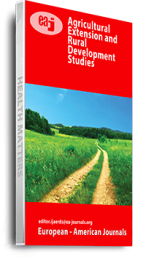Agroforestry is a sustainable land-use system that offers multiple benefits compared to sole operation of its components. Tuskegee University Cooperative Extension in collaboration with the 1890 Agroforestry Consortium developed a training handbook and educated 50 farmers, forestland owners, community educators, and professionals to implement and expand agroforestry practices in the Southeast. An impact assessment was carried out to measure the changes in people’s knowledge, attitude, behavior, and condition. An online SurveyMonkey, field visits, and follow-up communications were introduced to collect data. A descriptive and correlation analysis were carried out to assess impact of the program. Results showed that 100% of respondents greatly strengthened their knowledge concerning agroforestry practices, 60% of the respondents applied the acquired knowledge, 50% adopted agroforestry practices, 70% diversified the sources of income, and 537 people were benefitted through spillover effect. Agroforestry operation enhances land use efficiency, diversifies income sources, and increases socio-economic and environmental benefits.
Keywords: Financial Risk Reduction, Income Diversification, Knowledge and Skills, Socio-economic impacts, Training-of-Trainers

